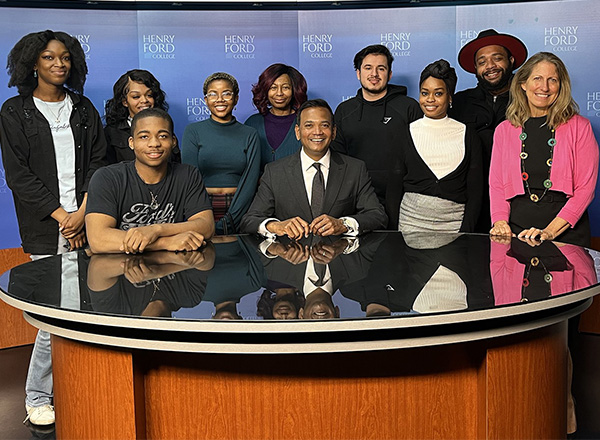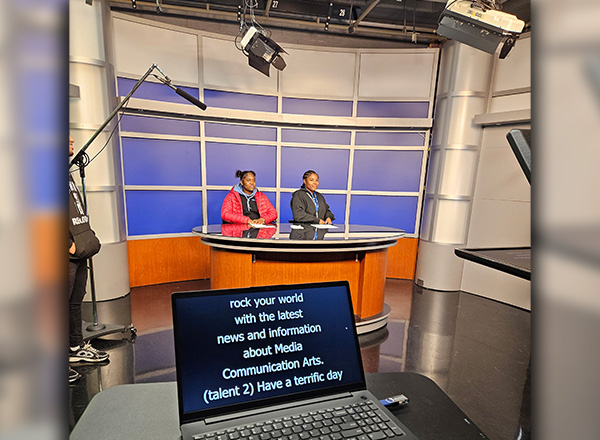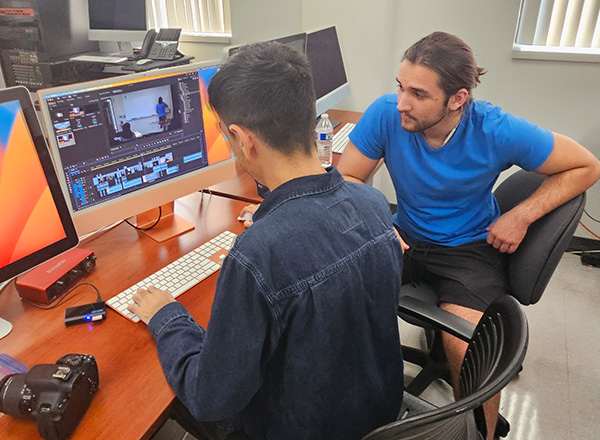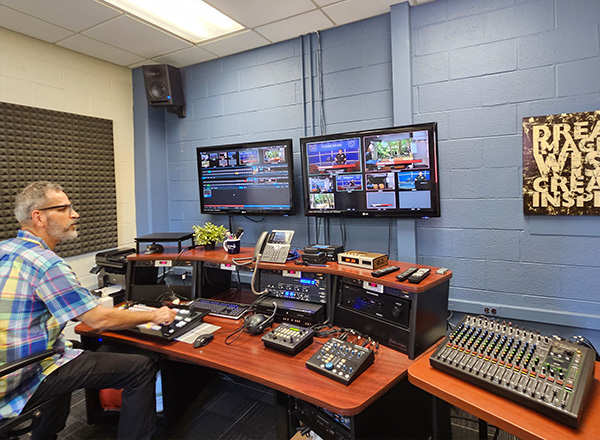Media Communication Arts offers rare combo of top-tier study and real-world practice

Leading the way with top-tier teaching and state-of-the-art technology is a way of life at HFC. That's why the Media Communication Arts program is the newly-minted name and face of the former Telecommunication program.
Longtime HFC faculty member Susan McGraw remains the department chair.
“This is not a brand-new program, but a rebranding and modernization of the name, look, and feel of the program,” said McGraw. “We wanted to give a nod to the future of the creative media industry with this sleek new name to complement our newly upgraded state-of-the-art facilities and equipment.”
To make it easy for students, all course numbers remain the same in the HFC course schedule. Students can simply look for and select the MCA prefix for classes (i.e., TCM 131 is now MCA 131, etc.).
MCA instructor Courtney Spivak agreed with McGraw about the new name.
“The name change is an excellent step toward the future of our department as it better reflects the modern media concepts we are currently teaching. I feel it will attract new students to the College,” said Spivak.
Three powerful words
McGraw spoke at length about rationale behind the name change.
“Telecommunication was the name of the program when I inherited it from (retired HFC instructor) Jay Korinek in 2007,” she said. “When you pluralize the word to ‘telecommunications,’ people think it means stringing up cable wires and fiber optics rather than true media content. It just doesn’t mean what it used to mean.”
McGraw continued: “We chose Media Communication Arts because each word reflects an aspect of our well-rounded curriculum and brings the name up to today’s – and tomorrow’s – media landscape to reflect the quality program that we offer. We have always been cutting-edge and very thorough in what we teach students. The new name now reflects that, and we believe will attract serious students who are looking to make their careers in media.”
The first word, “media,” refers to the various means of communication used to reach and influence people widely. It encompasses channels such as television, radio, newspapers, magazines, social media platforms, websites, and other forms of digital communication.
The second word, “communication,” means sharing stories and information and creating narratives. McGraw knew it was essential for that word to be part of the new name, as the power and responsibility of ethical communication is fundamental to the MCA curriculum.
The third word, “arts,” represents creativity. The arts bring depth, diversity, and creativity to today's media world, enriching the cultural landscape and providing a platform for exploration, reflection, and connection.
“While these three words mean different things individually, together they all support what we do here at HFC,” explained McGraw. “I’m immensely proud of that.”
A stepping stone to the workforce or to a bachelor’s degree
HFC updated the names of all former classes to reflect the new program name. Some content has been tweaked and updated to ensure students are learning what they most need, as the MCA program provides a stepping stone to any 4-year university to complete a bachelor’s degree or the start of a career after graduation.
“Our MCA course offerings are robust,” said McGraw. “In the fast-paced world of media, we're all creators and consumers. We dive into the theories and history while getting hands-on into real-world projects. It's not just learning: it's an immersive journey, challenging and supporting students every step of the way.”
MCA offers core class subjects with some advanced coursework and internships available for students as they near completion of the program:
- Introduction to Media Communication
- Media Performance
- Media Writing
- Broadcast Journalism
- Film History and Criticism
- Audio Production and Editing
- Video Production and Editing
- Introduction to WHFR Radio
“We’ll be completing our new podcast studios this summer,” said McGraw. “They’ll be located near the music wing in the MacKenzie Fine Arts Center (Building M on the main campus). Podcasts are very popular. Students have really connected with this communication medium, and we support our future podcasters in creating narratives that are important to them. In this increasingly diverse and interconnected world, we encourage our students to explore different cultural perspectives and foster empathy among various audiences. We’ve also had interest from academic units at the College to provide resources for podcast creation. We’re willing to share our knowledge and facilities with others at HFC.”
Four industry-driven categories
Media literacy is the fundamental key of the MCA program and the forefront of all MCA instruction. The MCA curriculum is organized into four categories:
- Production Skills: Explore media creation with shooting, directing, and producing; learn essential lighting and audio techniques.
- Editing Skills: Dive into video and audio editing; transform content with professional editing tools.
- Writing Skills: Learn the art of writing for various media, including scriptwriting, screenwriting, broadcasting, critiquing, podcasting, and media storytelling.
- Performance Skills: Unleash your potential in front of the camera or microphone; develop skills in voiceover, interviewing, dramatic performance, teleprompter reading, improv, ad-lib, ensemble work, and more to stand out in an audition.
“Knowing the fundamental skillsets of these four categories makes a student well-rounded and marketable in today’s media world,” said McGraw. “You can do many things with an MCA degree. It’s amazing how many different career areas utilize the media arts, as the field centers around the ability to communicate your message effectively through any media channel.”
McGraw pointed out HFC has great relationships with its university transfer partners.
“They love what we’re teaching our students and welcome them with open arms,” she said. “We’re forging partnerships with new universities all the time.”
Proud to offer students cutting-edge equipment and facilities
One thing that never gets old for McGraw, her fellow MCA instructors Spivak, Dr. Tom Hopkins, and HFC lab technicians Abass El-Moukahal, Cortney Markham, and D. Mark Hall is seeing the looks on students’ faces when they walk in on their first day.
“We’re so proud to offer students such great equipment and experiences. On the first day, students walk in and say, ‘Wow, this looks like a professional TV studio!’ That’s because it is!” said McGraw. “We’re using equipment they’ll use when they go into the industry, something we’re very proud of! It allows them to get hands-on experience with real-world equipment, helping our graduates to be more marketable. That’s very important to us.”
Hall sees the new name as part of a cultural and technological shift. “The change in name reflects our goal to meet technology and society where they are and where they are going. There are a lot of people doing podcasts on their own – to varying degrees of professionalism. Our new focus will enable people to improve the content they create and how it will be remembered. Artificial intelligence (AI) has misled a lot of people to think they can do a lot of our profession without education and experience. But having the tools and employing them to the highest standards are not the same thing. Come take a look at what we offer, and you'll have a fuller picture,” explained Hall.
The MCA program’s cutting-edge facilities and equipment are available for students to explore and innovate. This includes:
- An equipment check-out office to access top-tier tech for projects.
- Updated TV studio and control room with new TriCaster switcher and 4K cameras, professional SM7B microphones, and studio sets.
- Mac editing lab with 20 up-to-date Mac workstations for creative projects, equipped for video and audio editing.
- A Foley sound booth for creating professional sound effects.
- Podcast studios launching in the Fall 2024 semester.
- WHFR-FM, HFC’s student-run radio and internet station, which can be heard in 22 different cities in the Metro Detroit area on the FM dial and online worldwide.
"At WHFR-FM, we're the real deal – an authentic FM radio station. Our students and volunteers create our own weekly shows," McGraw emphasized. "It's rare for a community college in the region to boast a genuine radio station like ours. We owe it to our supportive administration, granting us full autonomy over our broadcasts for nearly four decades."
Hands-on from Day One
“For our students in the MCA program, it’s a hands-on journey from Day 1," said McGraw. "We explore media evolution and cutting-edge theories while immersing ourselves in real-world projects with professional facilities and equipment. Just as you can’t have good video without good audio, you also can’t have good content without good writing. Many programs spend too much time on the A/V side of things, and they don’t do enough to teach the art of the written word. We’re very proud of this component of our program.”
MCA instructors are also industry professionals who are ready to share their wisdom, insights, and media contacts with students. The instructors focus on creativity and expression, cultural reflection, critical thinking, and innovation and experimentation.
“We are out there in the field; we’re not just teaching from a textbook,” said McGraw. “We are following the latest trends with real-world instruction and connecting with other people in the industry. This style of media curriculum that provides both theory and practice in a 2-year degree is rare.”



Related content: Media Communication Arts overview video
The former Department of Telecommunication is now the Department of Media Communication Arts.